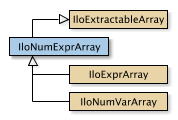
| Overview | Group | Tree | Graph | Index | Concepts |

For each basic type, Concert Technology defines a corresponding array
class. IloNumExprArray is the array class of the numeric
expressions class (IloNumExpr) for a model.
Instances of
IloNumExprArray are extensible. That is, you can add more
elements to such an array. References to an array change whenever an element
is added to or removed from the array.
| Constructor Summary | |
|---|---|
public | IloNumExprArray(IloDefaultArrayI *) |
public | IloNumExprArray(const IloEnv, IloInt) |
| Method Summary | |
|---|---|
public void | add(IloInt, const IloNumExpr) |
public void | add(const IloNumExpr) |
public void | add(const IloNumExprArray) |
public IloNumExprArg | operator()(IloNumExprArg) |
Inherited Methods from IloExtractableArray |
|---|
add, add, add, endElements |
| Constructor Detail |
|---|
This constructor creates an empty array of numeric expressions for use in
a model. You cannot create instances of the undocumented class
IloDefaultArrayI. As a parameter in this default constructor,
it allows you to pass 0 (zero) as a value to an optional parameter in
functions and member functions that accept an array as a parameter.
This constructor creates an array of n elements. Initially,
the n elements are empty handles.
| Method Detail |
|---|
This member function appends x to the invoking array. The
parameter more indicates how many times.
This member function appends x to the invoking array.
This member function appends the elements in array to the
invoking array.
This subscripting operator returns an expression argument for use in a
constraint or expression. For clarity, let's call A the
invoking array. When anIntegerVariable is bound to the value
i, the domain of the expression is the domain of
A[i]. More generally, the domain of the expression is the union
of the domains of the expressions A[i] where the i
are in the domain of anIntegerVariable.